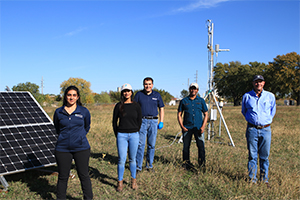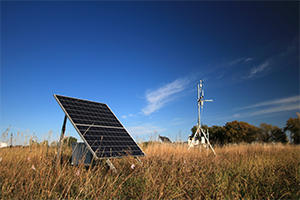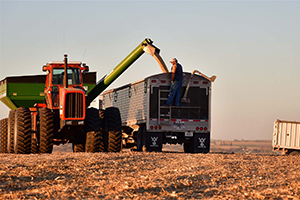Future Farming: Integrated Water Management Leads to Profitability and Sustainability

As technology advances, it has become increasingly clear how agricultural water management tools developed by Nebraska researchers and others around the world can help create powerful synergistic systems to support producers. This integration of tools is crucial to helping the world achieve the critical food production goals we need to meet as the world’s population grows—not to mention overcoming environmental challenges such as nitrogen leaching and climate change.
At this juncture in the development of technology and the work of the institute, connections between new technologies and strategies are coming to fruition. We are seeing the benefits of sophisticated projects that make combined, improved data available to farmers in convenient formats to help them make informed decisions that are conservation-friendly, profitable, sustainable and environmentally responsible.
Forecasting and risk analysis
One such project is the five-year $10 million U.S. Department of Agriculture-funded Dashboard for Agricultural Water Use and Nutrient Management (DAWN). It is an innovative forecasting and risk analysis system in development by a collaboration of researchers in several states to aid farmer decision-making at a field level. For one of its irrigation scheduling approaches, DAWN makes use of the SETMI and GloDET products developed by DWFI. SETMI uses remotely sensed imagery inputs from satellite, drone and aircraft platforms to estimate evapotranspiration and predict rainfall and irrigation needs. The University of Nebraska is receiving an $890,000 portion of the $10 million to complete its contributions to the project.
During the last fiscal year, DWFI researchers began re-coding the institute’s SETMI decision-support systems (DSS) to work in open-source software so it can be used by the DAWN DSS. Testing will continue this year. In addition to its previously developed tools, Nebraska is contributing a wealth of experience to DAWN, including input from hundreds of farmers in the Nebraska On-Farm Network who are standing by to help test the system.
SETMI is already providing prescriptions for center pivot irrigation systems. Up to now, the multi-sensor tool has helped farmers determine how long and where to operate traditional pivots, so they can vary the speed and length of application to minimize excess irrigation. But different parts of a field watered with a traditional pivot still can receive more or less water than needed.
Now, SETMI is being used with variable rate irrigation systems, providing prescriptions not only for individual fields but also for portions of fields where soil type, topography, rainfall and other factors result in different needs for water and fertilizer. The fine-tuned attention to varying needs within one field further advances producers’ ability to reduce wasted water and energy, as well as minimize nitrogen leaching.
DWFI is participating in a North Dakota State University project funded by NRCS that is analyzing irrigation prescriptions during the 2021 growing season using three different models under three different pivots. The project will continue next season using new models.
Measuring greenhouse gas emissions

SETMI is also being used to help model soil water content on a project designed to measure greenhouse gas emissions in corn production fields supplying the ethanol industry—a protocol that eventually could be used with other crops in other countries. The research in progress, funded with a $3 million grant from the U.S. Department of Energy and another half-million dollars of matching funds, is adding gas analyzers to measure carbon dioxide, nitrous oxide and methane fluxes, not only atmospherically through eddy covariance techniques, but from the soil surface with automatized soil chambers (underground). These technologies combined with extensive soil and plant sampling for nutrients, carbon and nitrogen allow researchers to estimate a complete carbon balance that can then be fed into lifecycle analysis models. These, in turn, provide data that shows how successful different production systems are at minimizing harmful effects of nitrous oxide emissions as well as efficiency in fixing carbon, which can provide a profit incentive in the form of carbon credits to the farmers in future carbon markets.
Over the last year, the research team purchased gas analyzers for the project and installed them at a Nebraska agricultural testing site. At the time of this writing, the same equipment was expected for delivery, to be installed in the Minnesota and Iowa project fields. Progress was slowed last year by COVID-19 due to supply chain difficulties and delayed delivery of microchips.
The combination of greenhouse gas measuring technology and modeling will lead to an increase in overall profitability as farmers adopt more efficient production systems in fixing carbon and management approaches to reduce emissions. Widespread adoption of efficient production systems is important, because mass producer adoption gives us the best chance to significantly and sustainably improve water productivity, food production and environmental quality in Nebraska and other states. Furthermore, once the technology is completed, tested and perfected, it can be applied to production agriculture in other parts of the U.S. and the world.
Nebraska as a testing ground of innovative technology

These tools and many others are allowing Nebraska, and the University of Nebraska, to play an important role in meeting the global challenge of accumulating and analyzing data for practical use by farmers. The state is a unique testing ground for these types of systems because of its climate variation from the semiarid west to the humid east, so systems can be tested along a comprehensive range of climate variability by the same teams. Nebraska also offers a long history of experience with efficient irrigation systems. The DWFI-created Nebraska Water Productivity Report shows that water productivity has been increasing in the state, in part due to improved irrigation management.
In terms of evaluating the success of improved water and agricultural productivity, Christopher Neale, DWFI Director of Research, suggests the proof will be seen in small rural coffee shops, where it’s a tradition for farmers to gather in the winter and compare notes on the growing season.
“Now, they talk about how many bushels per acre they produced during the season,” he explained. “We want them to say, ‘I got more bushels per inches of water used. I lowered my cost of production and increased my profit.’ That might mean fewer bushels and still making more money because they decreased irrigation applications, used less energy and pumped less from the aquifer, saved on fertilizer application and stored more carbon. That ultimately is what will result in sustainable change.”
Related Articles
DWFI Leads Smallholder Sustainable Irrigation Entrepreneurship Project in Sub-Saharan Africa
When it comes to food and water security, in addition to building large centrally managed irrigation infrastructure projects, it’s important to help smallholder farmers make decisions on personal investments in irrigation, including the design, purchase, and installation of irrigation systems....
New Agricultural Water Economics Team Advances Water Policy
Increasingly frequent drought events pose a high risk to agricultural producers in the U.S. and other farming areas around the world. The need for a better understanding of how to manage water resources to help mitigate drought and other impacts of climate change has spawned a new era of water policy....
Small Rwandan Agribusiness Entrepreneurs Work in New Ways Following COVID-19 Restrictions
In 2020, UNL and DWFI researchers received support to collaborate with the International Fund for Agricultural Development (IFAD) on a multi-country agricultural entrepreneurship project in sub-Saharan Africa. But COVID-19 had locked down the world, including travel, so team members that were recruited for the IFAD project began by working to understand how small agribusiness entrepreneurs were affected by the pandemic.
ANNUAL REPORT 2021
- Overview
- Letter from the Executive Director
-
Research and Projects
-
Global and National
- DWFI Leads Smallholder Sustainable Irrigation Entrepreneurship Project in Sub-Saharan Africa
- New Agricultural Water Economics Team Advances Water Policy
- Small Rwandan Agribusiness Entrepreneurs Work in New Ways Following COVID-19 Restrictions
- Future Farming: Integrated Water Management Leads to Profitability and Sustainability
- Modeling Brazilian Aquifer Will Help Farmers Maximize Crop Water Productivity
- DWFI experts contribute to FAOs State of Food and Agriculture 2020
-
Nebraska
- Hub Brings Together Faculty for Greater Impact in Water and Cropping Systems
- Researchers Explore Potential AltEn Ethanol Plant Contamination Effects on Local Residents
- Impact of Covid-19 on Midwest Agtech Entrepreneurship
- Nebraska Nitrate Working Groups Tackle Persistent Drinking Water Contamination
- Nebraska Smart Farms Drive Technology Adoption
-
Faculty Fellows and Supported Students
- DWFI Welcomes Eight New Faculty Fellows
- DWFI Funds Research of 10 New Students in Food and Water Security
- Water for Food Student Impact Workshop and Research Forum
- Investigating Climate’s Influence on Atrazine Groundwater Contamination
- Sustainable Water Management: Solving the Mystery of Nebraska’s Intricate Aquifer System
- Drones Provide Detailed Picture of Wetland Health
- Understanding Corn Ear Abnormalities to Close Yield Gaps
- Examining the Effects of Agrichemical Contaminants on Pediatric Cancers
-
Global and National
-
Education
- Virtual Webinar Series Attracts Various Audiences
- One Health Webinar Series Discusses Health and Well-being of Humans Animals and the Environment
- Water and Health Summit Brings Together Leaders to Clarify Issues in Nebraska, Define Solutions
- NWC Hosts Virtual Mini-Conference
- Policy Team Leads Student Course on Securing and Sustaining Water for Food Globally
- Plans for Water for Food Global Forum Underway
- Regional Event Localizes Findings of the 2020 Lancet Countdown Report
- Communication
- Development and Organizational Sustainability
- Resources
- Search
ANNUAL REPORT 2021
- Overview
- Letter from the Executive Director
-
Research and Projects
-
Global and National
- DWFI Leads Smallholder Sustainable Irrigation Entrepreneurship Project in Sub-Saharan Africa
- New Agricultural Water Economics Team Advances Water Policy
- Small Rwandan Agribusiness Entrepreneurs Work in New Ways Following COVID-19 Restrictions
- Future Farming: Integrated Water Management Leads to Profitability and Sustainability
- Modeling Brazilian Aquifer Will Help Farmers Maximize Crop Water Productivity
- DWFI experts contribute to FAOs State of Food and Agriculture 2020
-
Nebraska
- Hub Brings Together Faculty for Greater Impact in Water and Cropping Systems
- Researchers Explore Potential AltEn Ethanol Plant Contamination Effects on Local Residents
- Impact of Covid-19 on Midwest Agtech Entrepreneurship
- Nebraska Nitrate Working Groups Tackle Persistent Drinking Water Contamination
- Nebraska Smart Farms Drive Technology Adoption
-
Faculty Fellows and Supported Students
- DWFI Welcomes Eight New Faculty Fellows
- DWFI Funds Research of 10 New Students in Food and Water Security
- Water for Food Student Impact Workshop and Research Forum
- Investigating Climate’s Influence on Atrazine Groundwater Contamination
- Sustainable Water Management: Solving the Mystery of Nebraska’s Intricate Aquifer System
- Drones Provide Detailed Picture of Wetland Health
- Understanding Corn Ear Abnormalities to Close Yield Gaps
- Examining the Effects of Agrichemical Contaminants on Pediatric Cancers
-
Global and National
-
Education
- Virtual Webinar Series Attracts Various Audiences
- One Health Webinar Series Discusses Health and Well-being of Humans Animals and the Environment
- Water and Health Summit Brings Together Leaders to Clarify Issues in Nebraska, Define Solutions
- NWC Hosts Virtual Mini-Conference
- Policy Team Leads Student Course on Securing and Sustaining Water for Food Globally
- Plans for Water for Food Global Forum Underway
- Regional Event Localizes Findings of the 2020 Lancet Countdown Report
- Communication
- Development and Organizational Sustainability
- Resources
- Search
Search More Articles
Search the 2021 Annual Report for more articles.
COOKIE USAGE:
The University of Nebraska System uses cookies to give you the best online experience. By clicking "I Agree" and/or continuing to use this website without adjusting your browser settings, you accept the use of cookies.

